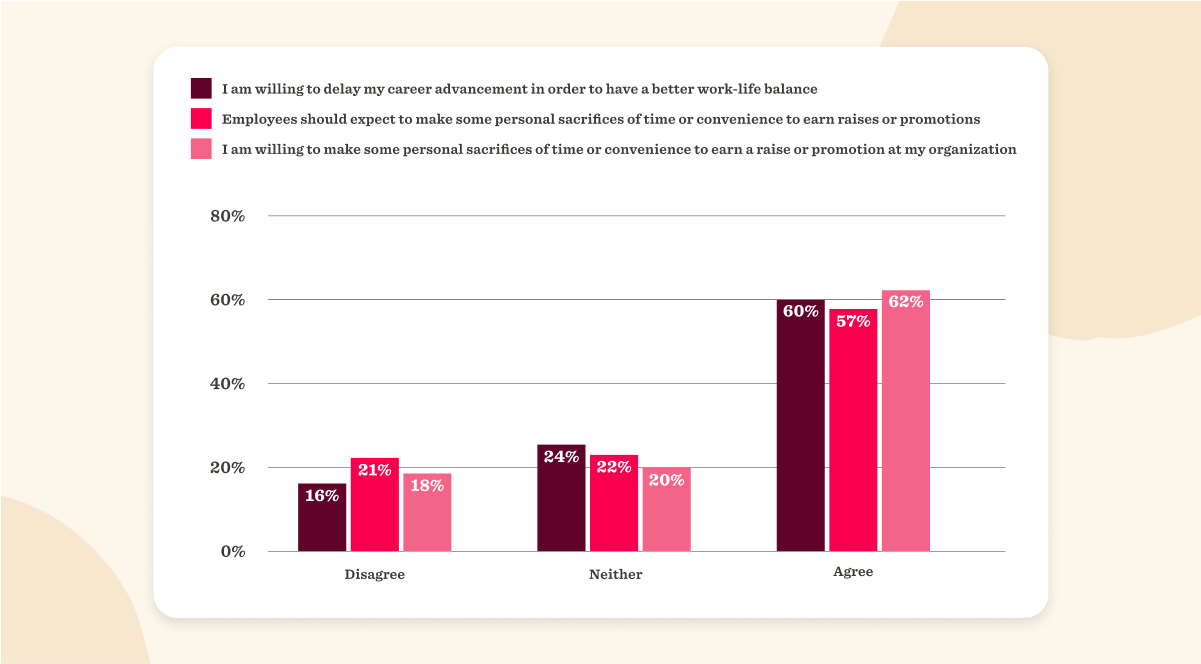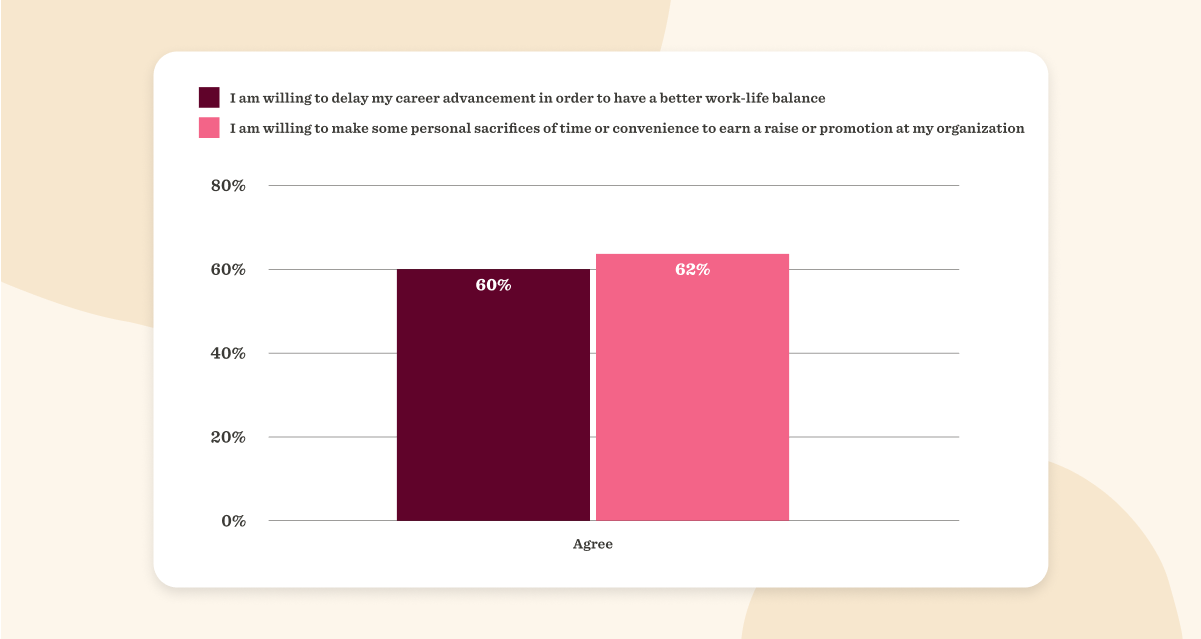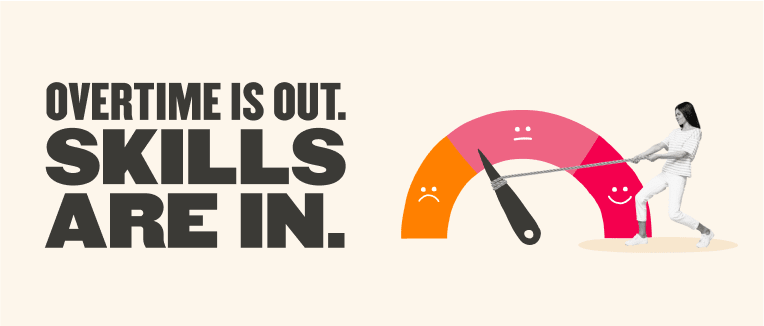For decades, companies defined workplace ambition by long hours, heavier workloads, and a relentless push for promotions. However, our latest survey of 3,600 full-time employees in the US, UK, Australia, and the DACH region reveals a critical shift.
Employees aren’t just investing in their employers; they’re investing in themselves. I’ve spent a lot of time analyzing the data from this survey, including how it supports the ROI of leadership development, which I wrote about in a separate blog here. This time, the data points to another major shift that challenges what we thought we knew about career growth.
Our new data insights challenge long-standing assumptions about ambition, why the old formula of “work more, get ahead” no longer applies, and what companies must rethink to keep their people motivated and engaged.
I’m excited to share my new findings in this blog and show you the data on how employees shift their priorities. I’ll also include some recommendations on what you can do as an HR leader to keep pace with this change.
Let’s dive into the data.
Employee sacrifice will be on their terms
When I first saw the data, one thing stood out right away. Employees aren’t rejecting hard work or career advancement. They still want to grow, take on challenges, and be recognized for their contributions.
What’s changed is how they’re willing to make those sacrifices.
Our survey shows that 57 percent of employees believe some level of personal sacrifice—whether time, effort, or convenience—is necessary to earn raises or promotions. A slightly higher proportion, 62 percent, say they are personally willing to make those sacrifices. At first glance, this might suggest that the traditional view of working harder to get ahead still holds up for the majority of employees. But when I dug deeper into the data, I found something unexpected.
When asked what kind of sacrifices they were willing to make:
- 63 percent said they would learn a new skill or credential
- 62 percent said they would take on new responsibilities
- Only 35 percent said they would increase their workload
- Only 31 percent said they would extend their work hours

This marks a critical shift.
Employees aren’t avoiding effort; instead, they invest in it differently. Instead of simply taking on more work or staying late, they’re prioritizing skill-building and meaningful career development.
Learning new skills and credentials isn’t just about impressing their current employer. It’s a long-term career investment that makes them more competitive in the job market and gives them greater career security in an uncertain economy. Taking on new responsibilities, rather than just more tasks, allows them to grow in purposeful and rewarding ways.
Employees are still willing to put in the work, but they’re being far more intentional about where that effort goes. Instead of overextending themselves in ways that might lead to burnout and ultimately have little impact on job security, they focus on personal growth, career security, and sustainable success.
If companies continue to measure ambition by hours worked rather than skills gained, they risk overlooking their most dedicated people.
The shift from overworked to strategic growth
For years, companies have told us that working harder leads to better job security, career growth, and success. However, I found a disconnect between effort and security when I examined the data.
Hard work won’t save you
One of the most revealing insights from our survey is that 33 percent of people believe that hard work alone will not protect them during a layoff. This reflects a broader trend in which employees recognize that performance and dedication are not always enough to safeguard a position, especially in an era of frequent restructuring and economic uncertainty.
If more work doesn’t guarantee job or career security, employees lose motivation to work longer just for the sake of it. Instead, they focus on learning new skills they can articulate in a job interview to position themselves for their next career step. In an unstable, AI-driven economy, having a diverse set of valuable skills provides more stability and career growth than relying on the ability to perform a limited set of tasks repeatedly.
Strategic effort over sheer effort
Instead of relying on a traditional approach to job security through intense effort, people are shifting their focus toward building career security through developing skills, earning credentials, and gaining experience. This will make them more competitive in the job market, whether at their current company or elsewhere.
This is the paradox we’re seeing today. Employees are still ambitious. However, they are redefining what effort means. Rather than putting in extra hours at the expense of their wellbeing, they are making strategic choices about how they invest their time.
Work-life balance trumps faster promotions
Companies once measured success by how quickly employees climbed the corporate ladder. Promotions, raises, and titles signaled ambition and achievement. But today’s employees are taking a different approach to career growth, prioritizing sustainability over speed.
Our latest survey reveals that while 62 percent of employees say they are willing to make sacrifices for career advancement, 60 percent also say they would be willing to delay a promotion to maintain a better work-life balance.
At first glance, this might seem like a contradiction. But when you look closer, it’s clear that employees are making a conscious choice. They still value career growth but are no longer willing to achieve it at the cost of their wellbeing.

This shift reflects a growing awareness of burnout, mental health, and sustainability in the workplace. Employees recognize that pushing too hard and fast can lead to exhaustion rather than long-term success. Instead of chasing uncertain promotions at all costs, they choose career paths supporting growth and wellbeing.
For HR leaders, this presents a challenge and an opportunity. If career advancement is no longer the only driver of engagement, companies must rethink how they support and motivate their workforce. Organizations that prioritize growth opportunities, skill development, and meaningful career progression while ensuring employees are not overextending themselves will have a competitive edge in attracting and retaining talent.
A cross-generational trend
It would be easy to assume that younger employees drive this shift in workplace priorities. Gen Z and Millennials have been vocal about their focus on work-life balance and personal growth. But the data tells a different story. Employees across all age groups are rethinking how they approach work, career advancement, and personal success.
Our survey shows that while younger employees may have led the conversation, older employees are just as likely to prioritize skill-building and meaningful career progression over excessive workloads. This challenges the assumption that younger generations avoid traditional workplace expectations while older employees are more willing to put in long hours. The reality is that people at all stages of their careers are questioning whether the old model of success still applies.
The attitudes we associate with older generations may say more about the experiences of today’s senior leaders than about the generation itself. We are all familiar with memes about senior leaders questioning the work ethic of “kids these days.” However, it is important to remember that leadership takes time to achieve. Many senior leaders rose through the ranks when working long hours was the primary path to success. This isn’t just an age difference; it reflects selection bias in leadership.
This shift isn’t just about younger employees. It is about building a workplace culture that supports employees at every level. HR leaders who recognize this shift will be in a stronger position to retain top talent across generations.
Rethinking what HR can do
Employees are taking a more strategic approach to their careers, and it is time for companies to do the same. The old way of measuring effort, focusing on hours worked and tasks completed, is no longer enough to keep employees engaged or motivated. Organizations need to rethink how they define ambition, effort, and value.
Here are five ways employers can align with this shift:
1. Recognize and reward learning
Employees see upskilling as the key to career advancement. Rather than working longer hours, they invest in their skills to build long-term career security. Employers that want to stay competitive should make learning a core part of their employee experience. This means offering tuition reimbursement, credentialing programs, and time for professional development. It will be critical to recognize people who actively grow their skill set rather than just those who take on more work.
2. Create meaningful career progression paths
Employees are willing to work hard, but only when it leads to real career growth. Organizations must ensure that promotions and raises are tied to skill development, impact, and contribution, not just workload. Transparency is key. People who see a clear connection between their efforts and career progression are likelier to use the resources offered to stay engaged and committed.
3. Reframe hard work
The definition of hard work is changing. Employees no longer equate success with long hours and heavier workloads. Instead, they care about efficiency, innovation, and results. Companies should shift their focus from measuring hours to measuring outcomes. Encourage smart work rather than increasing workload. This will align with employees’ evolving priorities and help prevent burnout. It will also help future-proof your business with a pool of highly adaptive employees.
4. Offer flexibility to support work-life balance
Our survey found that 60 percent of employees are willing to delay promotions for better work-life balance. This is no longer a personal preference. It is a workplace expectation. Employers wanting to attract and retain top talent must offer flexibility through hybrid work, mental health resources, or sustainable workload expectations. Creating a culture that values wellbeing will set organizations apart in a competitive job market.
Recommended For Further Reading
5. Build trust and job security
Employees are hesitant to overextend themselves for a job that may not be secure. If companies want employees to invest in their work, they must invest in their people. This means fostering a culture of trust, stability, and internal mobility. High-performing employees should feel valued, supported, and confident that their efforts will be recognized, even during change. They should feel confident that their work today prepares them to be valued tomorrow, either at your organization or elsewhere.
Making work work for everyone
When I first encountered this insight, I wasn’t sure what to make of it. After working with the data, I saw that this shift aligns with trends we have seen in recent years. Employees are still ambitious and invested in their careers, but they are being more intentional about how they grow.
People still want to take on challenges, develop new skills, and contribute meaningfully. They just want to do it in a way that aligns with their long-term success and wellbeing. By recognizing this shift and adapting workplace cultures to match, companies can build environments where people feel motivated, engaged, and ready to do their best work.
HR leaders can drive business success by championing career growth and upskilling. When people have the opportunities and balance to develop their skills, companies unlock innovation and productivity. Long-term success follows.


